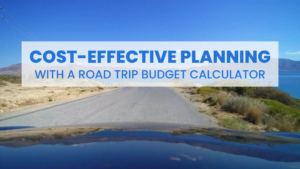Planning a vacation is exciting, but it can also be daunting when it comes to managing and saving on your vacation expenses. However, worry not, as this article provides you with some valuable tips on how to save money on vacation expenses while enjoying your dream getaway. From finding affordable accommodation options to mastering the art of budgeting, these tips will help you make the most of your vacation without breaking the bank. So, grab a pen and paper, jot down these valuable suggestions, and get ready to embark on an unforgettable and budget-friendly adventure!
Table of Contents
ToggleTransportation
Choosing a budget-friendly destination for saving on vacation expenses
When planning your vacation, one of the first things to consider is choosing a budget-friendly destination. Look for places that offer affordable accommodations, dining options, and activities. It’s also a good idea to research the exchange rate and cost of living in different countries to ensure you can make the most of your travel budget.
Booking flights in advance
To save money on flights, it’s best to book in advance. Airlines often offer discounted fares if you book your tickets well ahead of your travel dates. Keep an eye out for seat sales and promotions, and consider flying on weekdays or during off-peak seasons for even better deals. It’s also advisable to use flight comparison websites to compare prices and find the best deals available.
Using public transportation
Once you arrive at your destination, using public transportation can be a cost-effective way to get around. Many cities have efficient and affordable public transportation systems such as buses, trains, and trams. Research the local transport options, including passes or discount cards that offer unlimited travel for a set period. Opting for public transportation not only saves you money but also allows you to immerse yourself in the local culture and experience the city like a local.
Renting a car with friends
If you’re traveling with a group of friends, renting a car can be a cost-effective option, especially if you’re planning to explore multiple destinations or go on day trips. Splitting the cost of the rental and fuel among the group can significantly reduce transportation expenses. Additionally, having a car gives you the flexibility to create your own itinerary and explore off-the-beaten-path locations that may not be easily accessible by public transportation.
Accommodation
Opting for budget hotels or hostels
When it comes to accommodation, there are various options that can help you save money. Consider staying in budget hotels or hostels instead of high-end, luxury accommodations. These establishments often offer clean and comfortable rooms at a fraction of the price. Many hostels also provide communal areas where you can meet fellow travelers and exchange valuable tips and recommendations.
Considering vacation rentals
Vacation rentals, such as apartments or houses, are another cost-effective accommodation option, especially if you’re traveling with a group or staying for an extended period. These rentals often have kitchen facilities, allowing you to cook your meals and save on dining expenses. By staying in a vacation rental, you can also experience the local lifestyle and have more space and privacy compared to traditional hotel rooms.
Camping or staying at a campground
For nature lovers and adventurers, camping or staying at a campground can be an exciting and affordable accommodation choice. Many destinations offer well-maintained campsites with basic facilities such as toilets and showers. Camping not only allows you to connect with nature but also eliminates the need for expensive hotel stays. Just make sure to check local regulations and safety guidelines before pitching your tent.
Utilizing loyalty programs or rewards
If you frequently travel, it’s worth signing up for loyalty programs offered by airlines, hotels, and car rental companies. These programs often provide exclusive discounts, upgrades, and rewards based on your travel activity. Accumulating points and miles can help you save money on future trips. Additionally, credit cards with travel rewards can offer benefits such as free flights, hotel stays, or cash back on travel expenses.
Meals and Dining
Eating at local restaurants instead of tourist spots
When it comes to dining out, opting for local restaurants instead of tourist spots can save you a significant amount of money. Tourist areas often have higher prices, so venture out and explore the local culinary scene. Ask locals for recommendations or research popular eateries known for serving delicious, authentic cuisine at reasonable prices. This not only allows you to save money but also gives you a chance to experience the true flavors of your destination.
Cooking meals in your accommodation
If you’re staying in a vacation rental or hostel that has kitchen facilities, take advantage of it by cooking your meals. Buying groceries from local markets or supermarkets and preparing your own meals can be a cost-effective alternative to eating out for every meal. Not only will you save money, but you’ll also have the opportunity to try local ingredients and experiment with regional recipes.
Packing snacks and water
To avoid spending money on expensive snacks during your outings, always carry some snacks and a reusable water bottle with you. Packing granola bars, fruits, or other non-perishable snacks can help curb hunger while you’re out exploring. Additionally, refilling your water bottle at public drinking fountains or your accommodation can save you from purchasing expensive bottled water.
Taking advantage of happy hours and meal deals
Many restaurants and bars offer happy hour specials or meal deals during certain times of the day. Take advantage of these discounted offers to enjoy meals and beverages at a fraction of the regular price. Research local restaurants and bars to find out their happy hour schedules or any ongoing promotions. By planning your meals around these discounted periods, you can savor delicious food and drinks while staying within your budget.
Activities and Entertainment
Researching free or low-cost attractions
Before setting off on your vacation, conduct thorough research on free or low-cost attractions in your destination. Many cities offer parks, gardens, historical sites, or museums with free admission. Additionally, you’ll find street markets, local festivals, or cultural events that provide entertainment without breaking the bank. Take advantage of these opportunities to explore and immerse yourself in the local culture.
Visiting museums on discounted days
If you’re interested in visiting museums, look for discounted days or special promotions. Many museums offer reduced or even free admission on specific days of the week or month. Take the time to plan your museum visits accordingly, keeping these discounted days in mind. Not only will you save money, but you’ll also have the chance to appreciate the art, history, and heritage of the destination you’re visiting.
Participating in outdoor activities
Nature offers a multitude of activities that are not only enjoyable but also free or low-cost. Hiking, biking, or exploring national parks and nature reserves are excellent options for outdoor enthusiasts. You’ll have the chance to appreciate breathtaking landscapes, observe wildlife, and engage in physical activities without spending a fortune. Research the outdoor opportunities available in your destination and make the most of your surroundings.
Attending local festivals or events
Immerse yourself in the local culture by attending festivals or events happening during your visit. These celebrations often showcase traditional music, dance, food, and customs. Many festivals have free admission or a nominal fee, making them an affordable way to experience the local culture and entertainment scene. Check local event listings or ask locals for recommendations to find out about upcoming festivals or events during your stay.
Travel Insurance
Comparing different insurance options
Before embarking on your vacation, it’s essential to have travel insurance to protect yourself against unexpected events or emergencies. Take the time to compare different insurance options and choose a policy that suits your needs and budget. Look for coverage that includes medical expenses, trip cancellation or interruption, lost luggage, and personal liability. Reading reviews and consulting with a reputable insurance provider can help you make an informed decision.
Considering annual coverage
If you are a frequent traveler, it may be more cost-effective to opt for annual travel insurance coverage instead of purchasing individual policies for each trip. Annual coverage typically provides protection for multiple trips within a specific time frame, saving you both time and money. Before choosing an annual policy, ensure that it covers all the destinations and types of travel you plan to undertake during the year.
Check out travel insurance options available at Travelex following this link: Travel Insurance options ->
Checking if you’re already covered
Before purchasing travel insurance, it’s essential to check if you’re already covered through other means. Some credit cards, health insurance policies, or employer benefits may include travel-related coverage. Review your existing insurance policies and consult with the respective providers to understand the extent of coverage they offer. This will help you avoid purchasing redundant coverage and save money on unnecessary insurance expenses.
Opting for a higher deductible
When selecting your travel insurance policy, consider opting for a higher deductible. A deductible is the amount you are responsible for paying before the insurance coverage kicks in. By choosing a higher deductible, you can lower your premium cost. However, ensure that you can comfortably afford the chosen deductible amount in case you need to make a claim. It’s a balancing act between saving on premiums and ensuring you have adequate coverage when needed.
Currency Exchange
Researching exchange rates
Before traveling, it’s crucial to research the current exchange rates for the destination’s currency. Understanding the exchange rate will help you budget more accurately and ensure you are getting a fair deal when converting your money. Use reputable websites or financial institutions to check the exchange rates, and be aware that rates fluctuate daily. Consider exchanging a small amount of currency before you travel to cover immediate expenses upon arrival.
Avoiding airport currency exchange
While airport currency exchange services are convenient, they often charge higher fees and offer less favorable exchange rates compared to other options. If possible, avoid exchanging your money at the airport and instead look for alternative locations such as local banks or reputable currency exchange offices in the city. Doing so can save you money and enable you to get more value for your currency.
Using local ATMs for cash withdrawals
Using local ATMs to withdraw cash in the destination’s currency is usually a cost-effective option. Check with your bank before you travel to ensure that your debit or credit card will work internationally and inquire about any associated fees. Additionally, consider withdrawing larger amounts of cash to minimize the number of times you’ll need to use the ATM and potentially incur multiple withdrawal fees.
Considering using credit cards with no foreign transaction fees
Using credit cards that don’t charge foreign transaction fees can help you save money on currency exchange. These cards allow you to make purchases in the local currency without incurring additional fees for the conversion. Before your trip, contact your credit card provider to confirm if they have foreign transaction fees and inquire about cards that offer this cost-saving feature.
Souvenirs and Shopping
Setting a souvenir budget
When traveling, it’s easy to get caught up in the excitement of shopping for souvenirs. To avoid overspending, set a souvenir budget before you go. Determine how much you are willing to spend on items that will remind you of your trip and stick to that budget. This will help you prioritize your purchases and prevent impulse buying.
Purchasing local products
While shopping for souvenirs, prioritize purchasing local products to support the local economy and immerse yourself in the destination’s culture. Look for unique items that represent the country’s traditions, craftsmanship, or culinary specialties. By choosing locally made products, you not only bring home meaningful souvenirs but also contribute to the preservation of local traditions and skills.
Shopping at local markets
Local markets are treasure troves when it comes to finding authentic and affordable souvenirs. Browse through the stalls and interact with local vendors, who are often passionate about sharing the stories behind their products. Markets offer a wide range of items such as crafts, clothing, jewelry, spices, and fresh produce. Be prepared to bargain and negotiate prices to get the best deals and ensure you stay within your allotted budget.
Bargaining and negotiating prices
In many countries, bargaining is a common practice, particularly in markets or street vendors. Don’t be afraid to negotiate the prices to get a better deal on souvenirs or other purchases. However, remember to be respectful and fair in your negotiations. It’s also helpful to research and understand the local customs and etiquette regarding bargaining before engaging in negotiations.
Planning and Timing
Traveling during the off-peak season
One of the most effective ways to save money on vacation expenses is by traveling during the off-peak season. Off-peak seasons are periods when tourist destinations experience fewer visitors and offer lower prices for accommodations, flights, and attractions. Research the destination’s peak and off-peak seasons and plan your trip accordingly. Not only will you save money, but you’ll also enjoy a quieter and less crowded experience.
Booking during major sales or promotions
Keep an eye out for major sales or promotions offered by airlines, hotels, and travel agencies. These sales often occur at specific times of the year, such as Black Friday, Cyber Monday, or seasonal promotions. Take advantage of these opportunities to score discounted flights, accommodations, or vacation packages. Sign up for newsletters or follow travel-related websites and social media accounts to stay informed about upcoming sales and promotions.
Being flexible with travel dates
Flexibility with your travel dates can lead to significant savings. Consider shifting your travel dates by a few days or even a week to take advantage of lower prices. Midweek flights and accommodations tend to be cheaper compared to weekends, so adjust your plans accordingly. Being open to alternative departure or arrival airports can also provide more options and potentially lower fares.
Making a detailed budget and itinerary
Creating a detailed budget and itinerary helps you plan your expenses effectively and avoid overspending. Research the costs of accommodations, transportation, meals, attractions, and other activities in advance. Allocate a specific budget for each category and track your spending during the trip. Having a well-thought-out itinerary allows you to prioritize activities, avoid unnecessary expenses, and ensure that you make the most of your time and money while traveling.
Communication and Roaming
Using free messaging apps and VoIP
Instead of relying on expensive international text messages or phone calls, use free messaging apps and Voice over Internet Protocol (VoIP) services to stay in touch with family and friends. Popular apps like WhatsApp, Facebook Messenger, or Skype allow you to send messages, make voice and video calls over the internet, eliminating the need for expensive roaming charges.
Getting a local SIM card
If you need to make local calls or have access to data during your trip, consider purchasing a local SIM card. Local SIM cards can be easily obtained at airports, convenience stores, or mobile network provider shops. Look for prepaid SIM cards that offer affordable voice and data packages. By utilizing local rates, you can save money on international roaming fees and have seamless communication while abroad.
Enabling flight mode or turning off data roaming
To avoid accidental data roaming charges, enable flight mode or turn off data roaming on your mobile device when you’re not actively using it. This prevents your phone from automatically connecting to expensive international networks. Instead, rely on Wi-Fi connections available in your accommodation, cafes, or public areas to access the internet and communicate with others.
Checking with your phone provider for travel plans
Before you travel, consult with your phone provider to inquire about any international travel plans they offer. They may have packages or add-ons that provide discounted rates for voice, data, or texting services while you’re abroad. These plans are often more cost-effective compared to standard roaming charges. Ensure you understand the terms and conditions of the plan and the exact coverage it offers in your destination.
Tipping and Service Charges
Researching tipping culture in the destination
Tipping customs vary from country to country, so it’s crucial to research the tipping culture of your destination before you travel. Some countries have a strong tipping culture, while others include service charges in the bill. Understanding the local customs ensures that you tip appropriately and avoid either over-tipping or unintentionally causing offense.
Checking for included service charges
In certain countries, service charges may already be included in the bill at restaurants or hotels. Before tipping, check your bill to see if a service charge has already been added. If it has, additional tipping may not be necessary unless the service was exceptional. However, if a service charge is not included, it’s customary to tip around 10-20% depending on the quality of service.
Tip in local currency to avoid exchange fees
When tipping in cash, it’s recommended to tip in the local currency to avoid additional exchange fees. This is particularly important when using foreign currency, as it may incur extra costs for the recipient when exchanging it. If you haven’t had the chance to exchange currency, consider tipping with small denominations of US dollars or euros, which are widely accepted in many tourist destinations.
Consider tipping for exceptional service only
While tipping is often customary in many countries, it’s important to recognize that it is not mandatory. It is acceptable to tip for exceptional service or when you feel genuinely satisfied with the service provided. If you encounter subpar service, do not feel obligated to tip. Assess each situation independently and use your discretion when deciding whether to tip or not.



